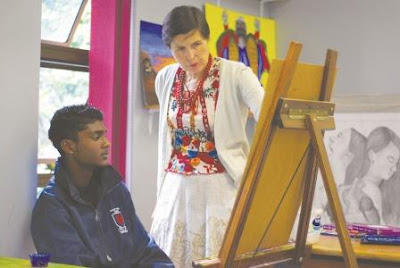 |
| Fraser Speirs with Michelle Lissoos |
I am passionate about iPads in schools. Especially since I have seen what
children are able to do with the iPad, and the yearly
iPad in Education Awards which are totally awesome!
(I do not get an iPad for saying this!
I just love LOVE my own iPad2, wishing I have the most recent one! - Hint-hint, Universe!)
I really hope my child's school will incorporate it in their learning programme. Apparently they have a three year plan in place! I have been one of the parents asking, again and again!
Fraser Speirs toured South Africa recently, made possible through the iStore. His claim to fame is that he is involved with the first school in the world that incorporated iPads 1:1 in their school. He has a background in software development and systems administration, and has been involved daily in the classroom.
I attended a session as part of a roadshow at Kingsmead School on 12 September, where
Michelle Lissoos, Head of Think Ahead, introduced him. They provide the iPad solutions to schools, from pre-primary to higher education. They have flexible iPad solutions available, which addresses budget vs vision issues. A mobile lab is one way of introducing iPads to a school learning environment.
ZA Books is the text book store for iPad. It is not only about text books, but a sure way to start on the iPad route in a school.
Education app guides are available for primary and secondary education. Schools also starts with working with a core set of apps, which helps a lot with implementation.
They have made a 12 months interest free finance plan available to schools for buying iPads, and there are different purchase plans to match schools financials.
Fraser Speirs about their 1:1 implementation at Cedars School of Excellence in Greenock, Scotland:
"Technology must always be subservient to goal of education to be effective!"
- Internet research is available in class to everybody.
- Everyone challenged on a level that suits them.
- 100% more engagement in the class.
- Some statistics:
- 50,000,000,000 connected devices by 2025
- 7 connected devices per person on planet
- The world is already 1:1
- They spent 11 years to get their teachers to use technology.
- iPads with 10 hour battery, 9.7" screen, 1.5 pounds changed the scenery.
- They have found the "sweet spot" in usability, where they have adaptability to most tasks - Tasks of medium to moderate complexity.
- Bringing your own device is not a good idea, with the following issues:
- big players are going vertical in mobile
- "Equally bad everywhere" problem
- "School uniform" problem - devices should be all the same.
- They are hiding the integration cost in cost of staff effort.
- The Web is Not Enough! any more.
- Technology is as accessible as paper.
- Different stages for different individuals / learners.
- Not an ICT project, but about improving education! They are even going into the gym.
- The teacher training programme starts with:
"It's essential that the teachers live with the iPad"
- The way of using it in the classroom: Research, synthesize and give back to teacher with the use of apps.
- They have a remedial for children coming from other schools in place.
- The stats show consistent better results!
"Students in iPad classes outperformed every other student!"
- They have put their curriculum on iTunesU. Found it to be very useful!
- During exams they deliberately use iPads less to put in exercises where students have to write for longer periods of times.
- They use Showbie for assessments which can be annotated by the teacher.
- Google Drive also very effective.
- Student teachers are not getting technology teaching > only 1 day in training > major issue ( in Scotland).
- 2% damage and failure over a year > 7 were damaged or failed. 0% stolen and 0% lost! (where Android devices have a 40% failure rate!)
- The right case to protect corners and closes cover of screen. (Important!)
- Ownership > school owns the entire set with a lease for 3 years. It stays with the kid, but if kid leaves, it stays behind.
- Everything begins with the leaders in the school! The head teacher and deputies should be there when introducing and starting an iPad programme.
- Some apps that are great to use:
Showbie,
Explain everything - whiteboard,
Book creator,
Adobe Reader,
PDF creator
- How to get parents on board? Built cost of deployment in school fees. Parent information evenings, and explaining the educational validity. Today a whole lot more of information to convince parents. University if Holland did a very favourable research study.
- Wi-fi issues and density of use can crop up > performance issues > the solution is to have enough base stations.
It is very exciting times!























+(780x800).jpgs.jpg)

























